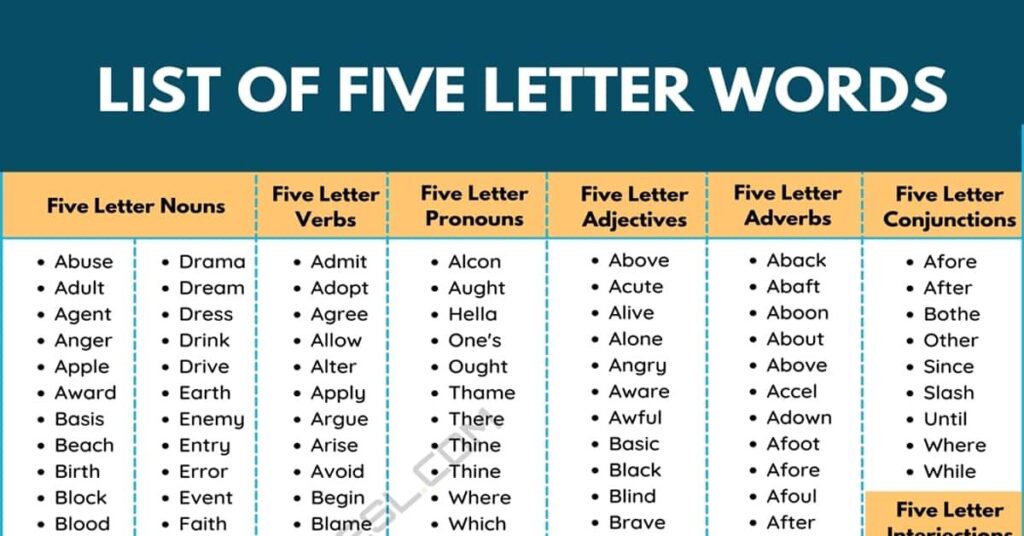Unlocking the Possibilities: Five-Letter Words from “Slicer”
The English language is rich with words that can be crafted from various combinations of letters. Among these, five-letter words offer a unique challenge and utility. With the letters from the word “slicer,” a variety of five-letter words can be formed, each with its own meaning and significance. This article explores some of the notable five-letter words derived from “slicer,” delving into their meanings, uses, and how they enrich our vocabulary.
1. Cries
Meaning and Usage: The word “cries” is a plural noun derived from the verb “cry,” meaning to shed tears or to call out loudly. It can refer to the act of crying or to loud, piercing sounds.
Examples:
- “The cries of the baby could be heard from the next room.”
- “In times of distress, the cries for help become more urgent.”
Significance: “Cries” is a versatile word often used in both literal and metaphorical contexts. It can describe emotional responses or be used to convey a sense of urgency and distress in various situations.
2. Slice
Meaning and Usage: The word “slice” is a noun that refers to a thin, broad piece cut from a larger object, often food. It can also be used as a verb meaning to cut something into slices.
Examples:
- “She cut a slice of bread to make a sandwich.”
- “The chef will slice the vegetables before cooking.”
Significance: “Slice” is a common term in culinary contexts but also finds use in everyday language to describe divisions or portions of various items. It highlights the concept of division and portioning, which is applicable in both literal and figurative senses.
3. Slicer
Meaning and Usage: “Slicer” is a noun that refers to a person or device that slices something. In kitchen terms, it is often used to describe a tool designed for slicing food.
Examples:
- “The chef used a slicer to prepare the vegetables for the salad.”
- “A good slicer can make food preparation much more efficient.”
Significance: The term “slicer” is particularly relevant in cooking and food preparation. It emphasizes the role of devices or individuals in creating uniform cuts, which is crucial for both presentation and cooking consistency.
4. Reels
Meaning and Usage: The word “reels” is the plural form of “reel,” which can refer to a cylinder on which film, wire, or other flexible materials are wound. It can also describe a type of dance or a part of a fishing rod.
Examples:
- “The reels of film were carefully stored in the archive.”
- “He caught a large fish and had to adjust the reel on his rod.”
Significance: “Reels” encompasses a range of meanings, from film and fishing to dance. Its versatility highlights various contexts where items are wound or spun, reflecting both practical and cultural aspects.
5. Slicer
Meaning and Usage: As previously noted, “slicer” also fits within the five-letter word category. It signifies a device or person that slices, often used in culinary settings.
Examples:
- “A slicer is an essential tool in many commercial kitchens.”
- “With the help of a slicer, preparing large quantities of food becomes easier.”
Significance: The term “slicer” is valuable in discussions about food preparation and kitchen equipment. It represents the functional aspect of slicing, crucial for efficient and precise food handling.
Conclusion
Exploring five-letter words formed from “slicer” not only enriches our vocabulary but also sheds light on their diverse applications and meanings. Words like “cries,” “slice,” “slicer,” and “reels” illustrate how a set of letters can create terms used in various contexts—from emotional expressions and food preparation to practical tools and cultural references.
By understanding and utilizing these words, we enhance our ability to communicate effectively and precisely. Each word carries its own significance and usage, contributing to the richness of the English language and demonstrating the flexibility inherent in word formation.
Whether you’re a writer, a language enthusiast, or simply curious about words, these five-letter terms offer insight into how letters come together to form meaningful and useful vocabulary.



